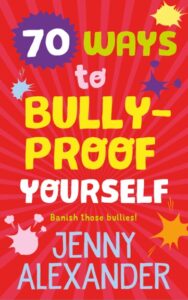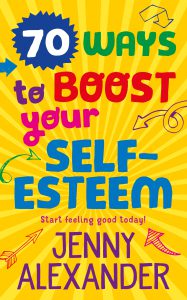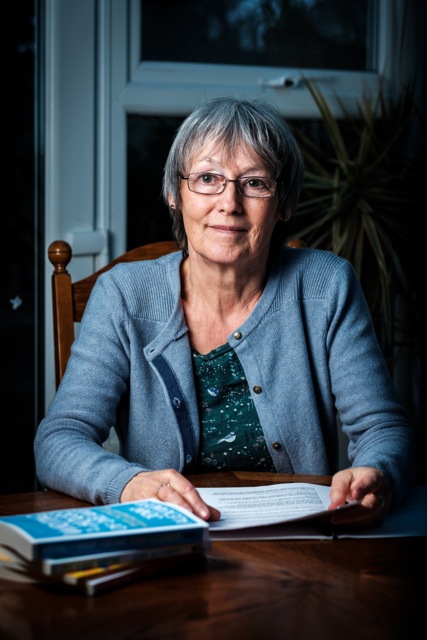
Jenny Alexander describes why she wrote a children's self-help book about bullying
Many authors in multiple genres find self-publishing a useful resource for sharing their backlist that has gone out of print under a trade publishing contract. Jenny Alexander explains why she has been glad to self-publish an updated edition of a fun, practical self-help book for children that she wrote many years ago . Today she tells us why, in the midst of a career writing all kinds of fiction and
non-fiction for all ages, this topic is still very close to her heart.
Years ago, when one of my children was being bullied at school, I discovered that all the usual advice on bullying was worse than useless:
- Pretend not to care? As if most bullied children would have the acting skills to carry that off!
- Hit back? How does that work, when the vast majority of bullying is non-physical?
- Tell a teacher? Probably worth a try, but children themselves, when interviewed by ChildLine, said telling could be a risky strategy that might not only be ineffective, it could also make things worse.
Schools are usually good at dealing with physical bullying, but non-physical bullying is harder to identify and tackle.
Children told ChildLine, the UK phone counselling service for children, that they wanted to know how to help themselves.
An Author's Response to Her Child's Bullying Issue

Self-publishing has enabled Jenny Alexander to update and reissue her original book about bullying this month
I was a fairly new children’s author at that time and I did what authors do: I researched the problem. I discovered that lasting physical harm from bullying is vanishingly rare, but the psychological damage caused can last a lifetime.
Anyone who suffers prolonged bullying is likely to develop low self-esteem, loss of self-confidence and overwhelming feelings of shame, unhappiness, anger and anxiety. Once those victim feelings set in, children become incapable of protecting themselves, even to the extent of being able to tell a trusted adult about what is going on.
My research turned up some very simple but effective ways that anyone could learn to build up their resilience and manage these difficult emotions. Although most of them are now part of the Cognitive Behavioural Therapy toolkit, in those pre-CBT days, you could only find them in self-help books.
I tried various practical strategies with my child and put the ones that worked together in my own self-help book for parents dealing with bullied children.
Then I thought, ‘I’m a children’s author. All these ideas would be perfectly easy to understand and put into practice for children age aged 8+. so why not write them directly for children as well?
When Hodder published Bullies, Bigmouths and So-Called Friends in 2006, the reviewer in The Times gave it five stars and asked, ‘Could this be the first self-help book for children?’
Self-Help Books: A Burgeoning Market…
At that time, adult self-help was a big and growing market, and I thought children’s self-help would soon start growing too. Evidently, so did Hodder, because they commissioned a four-book series of self-help books from me, including The 7-Day Bully-Buster, which I wrote as a sort of practical handbook of quick daily tasks children could do to develop a habit of robust attitudes and build up their psychological self-defenses in the face of bullying.
I was proud of the book; I felt it did something different and new. The head of Beatbullying, (a now defunct anti-bullying charity in the UK) in his review, said he would never normally pick up ‘this kind of book’ but, by the end of it, he wanted to cheer.
… Then Out of Print
But the series went out of print after a few years and, as far as I’m aware, there haven’t been other books since that do anything quite like it.
Children’s self-help hasn’t really grown, even though there has probably never been a time when helping children to help themselves was more important.
Children these days face complex pressures that are very different from the pressures their parents and grandparents faced as children, but the resources available to help and support them are decreasing.
A Timely Revival

The companion volume that Jenny Alexander previously self-published
So I’m back in the business of trying to provide children with access to helpful ideas presented in ways they can understand and enjoy, with plenty of jokes, stories, quizzes and cartoons.
70 Ways to Bullyproof Yourself has all that, plus 70 fun practical exercises children can use to build up their resilience and defend their happiness in a sometimes very challenging world. This follows 70 Ways to Boost Your Self-Esteem, which I published last year.
OVER TO YOU Have you self-published a self-help book in response to issues in your own personal life? Have you written a self-help book aimed at children and young people? We'd love to hear about them!
#Selfpublishing #selfhelp books - here's an inspiring case study of how @JennyAlexander4's books for children are helping them deal with #bullying Share on X
OTHER POSTS ABOUT WHAT PROMPTS AUTHORS TO WRITE ABOUT UNUSUAL THEMES
From the ALLI Author Advice Center Archive





I really like reading your articles, your articles are very helpful for me and among young people
you’re actually a excellent webmaster. The site loading pace is amazing.
It sort of feels that you are doing any unique trick. In addition, The contents
are masterwork. you’ve performed a excellent task in this topic!
What a great sounding resource, Jenny 🙂 I’ve shared on twitter. And how great that you get to bring it back to life!